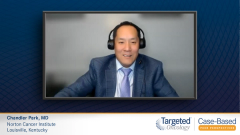
Unmet Needs in the Renal Cell Carcinoma Treatment Landscape
Chandler Park, MD shares clinical insights regarding care for patients with renal cell carcinoma, touching on treatment selection and managing adverse effects.
Chandler Park, MD: So what advice can I share for community oncologists that are treating patients with renal cell cancer, specifically, adjuvant therapy, unmet needs? I think we have to really come up and use our risk stratification. I talked about the UISS. Every patient that has a nephrectomy, we want to calculate that score to see what the percentage of disease-free survival risks. If they're an intermediate risk, we have to keep in mind that although pembrolizumab is a very effective treatment, there are some patients that are cured that may not need immunotherapy that we may be over-treating. And so, what's the downside of over-treating? All of us have used checkpoint inhibitors for our patients. And so, up to 10% of our patients can end up with permanent immune therapy associated toxicities. For instance, if a patient develops hypothyroidism, that's something that oncologists, if we treat somebody, and they did develop hypothyroidism, that might be a condition they have for the rest of their life. Adrenal insufficiency, immune therapy can cause an adrenal insufficiency where patients require hydrocortisone for the rest of their life. Now, that some of these studies are more maturing, we know that immune therapy can also put patients at risks for diabetes mellitus. And although, diabetes mellitus is a chronic condition, some of our patients may require metformin and insulin for the rest of their life. So my advice for the community oncologist is, do not consider all patients after nephrectomy as a one size fit all. We have to consider the risks versus benefits. I would use the UISS criteria to see if they fall into the intermediate risk, where I would shy away from adjuvant pembrolizumab versus high risk or M1 NED. Unmet needs, I think one of the things that we have to learn more about is we need a better biomarker, although these studies have used PD-L, that has not been a positive biomarker. We need a better biomarker to select patients, not just for uses in the UISS, but actually using the tissue to see if they would benefit from adjuvant pembrolizumab. So I would say a biomarker to help us select patients for adjuvant treatment as an unmet need.
Transcript Edited for Clarity

















